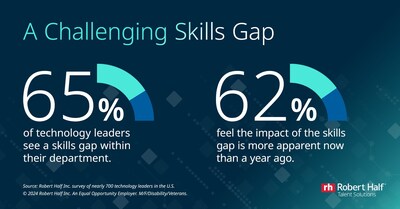New Robert Half Research Reveals Severity of the Technology Skills Gap Amid Talent Shortage
Rhea-AI Summary
Robert Half's new research highlights the severity of the technology skills gap, with 62% of tech leaders feeling the impact more today than a year ago. The report identifies key factors contributing to these gaps, tech leaders' priorities, and strategies for building future tech teams.
Positive
Organizations have a clear understanding of the challenges posed by technology skills gaps, with a focus on key priorities like security, AI, cloud projects, software engineering, and modernization.
Robert Half's report brings attention to the importance of a talent strategy aligned with long-term goals to address skills gaps effectively and achieve mission-critical projects.
There is a growing focus on the implementation of AI initiatives, with 90% of tech leaders planning to integrate AI into their operations, highlighting the need for talent with AI skills.
Negative
Nearly all tech leaders face challenges in finding skilled talent, with 51% predicting a significant hiring challenge due to a lack of applicants with essential skill sets.
The scarcity of available talent and significant skills gaps may lead to corner-cutting decisions that could negatively impact business projects and outcomes.
A lack of staff with AI skills is identified as a major barrier to success, with AI and machine learning skills ranking high on the list of evident skills gaps within tech teams.
News Market Reaction 1 Alert
On the day this news was published, RHI gained 0.20%, reflecting a mild positive market reaction.
Data tracked by StockTitan Argus on the day of publication.
62% of tech leaders feel the impact of skills gaps is more apparent today compared to a year ago- New report highlights factors contributing to the skills gaps, tech leaders' top priorities and strategies for building future-forward tech teams
Skills Gaps Threaten Business Priorities
According to the research, the top priorities for technology leaders this year include:
- Security of IT systems and information
- AI, machine learning and automation initiatives
- Cloud projects
- Technology modernization
- Software engineering and development
A finite pool of available talent and significant technology skills gaps could place these projects in peril and force corner-cutting decisions that may negatively impact the business. Nearly all tech leaders (
"It has never been more critical to have a talent strategy in place that aligns with your long-term vision and goals," said Ryan Sutton, executive director for technology talent solutions at Robert Half. "Without a defined hiring and retention plan to help fill technology skills gaps, it will be challenging to achieve objectives and complete mission-critical projects."
AI Brings Skills Gaps into Focus
The need to solve skills gaps has accelerated with the emergence of new AI capabilities. As shown in the report,
Organizations looking to leverage AI seek candidates with a mix of technical and soft skills. Among them are problem solving, communication, creative thinking and business acumen. And depending on a professional's role in the business, the knowledge and skills they may need to work effectively with AI can include:
- Programming
- Data analysis and statistics
- Machine learning
- Software engineering
- Ethics and responsible AI
- Big data technologies
- Deep learning frameworks
- Computer vision
Building Future-Forward Tech Teams
To help hire, retain and advance high-performing tech teams, Robert Half recommends the following strategies:
- Seek and develop high-potential candidates. Focus on recruiting technology candidates who have an eagerness to learn new skills that support business priorities and offer training to promising candidates who may not yet meet all your desired criteria.
- Embrace a scalable talent model. Adopting a mix of permanent, contract and consulting professionals can help bridge skills gaps quickly and efficiently, allowing your team to access professionals with specialized expertise, keep projects moving forward and stay agile.
- Support upskilling. Implement programs that encourage innovative thinking and ongoing learning. This will help prepare your employees and organization for the future and boost retention efforts.
Sutton added: "Today's technology professionals must continuously evolve and refine their skill sets and capabilities to be effective on the job. And tech leaders will need to provide plenty of training opportunities and leverage internal and external talent to keep up with business priorities and uncover new opportunities."
About the Research
The data from the report is from a survey developed by Robert Half and conducted by an independent research firm in October and November 2023. The survey contains responses from nearly 700 technology leaders at the director level or above at companies with 20 more employees in the United States.
About Robert Half
Robert Half (NYSE: RHI) is the world's first and largest specialized talent solutions and business consulting firm. We offer contract talent and permanent placement solutions in major professional fields, including technology. We find top-notch technology professionals across domains including software and applications development, systems integrations, infrastructure management, cybersecurity, networking and data science. In addition, our full-time engagement professionals bring continuity to technology initiatives best handled by the same person either on a recurring or long-term basis. Our industry-leading network of technology professionals can assist with projects on an on-site, remote or hybrid basis. Robert Half has been named one of the Fortune® Most Admired Companies™ and Most Innovative Companies and a Forbes Best Employer for Diversity. Explore our comprehensive solutions, research and insights at RobertHalf.com.
![]() View original content to download multimedia:https://www.prnewswire.com/news-releases/new-robert-half-research-reveals-severity-of-the-technology-skills-gap-amid-talent-shortage-302139097.html
View original content to download multimedia:https://www.prnewswire.com/news-releases/new-robert-half-research-reveals-severity-of-the-technology-skills-gap-amid-talent-shortage-302139097.html
SOURCE Robert Half
FAQ
What are the top priorities for technology leaders according to Robert Half's research?
The top priorities for technology leaders include security of IT systems and information, AI and automation initiatives, cloud projects, technology modernization, and software engineering and development.
What percentage of tech leaders feel the impact of skills gaps more today compared to a year ago?
62% of tech leaders feel a greater impact of skills gaps today compared to a year ago, according to Robert Half's research.
What is the biggest barrier to success for tech leaders implementing AI initiatives?
The lack of staff with AI skills is identified as the biggest barrier to success for tech leaders planning AI initiatives, according to Robert Half's report.








